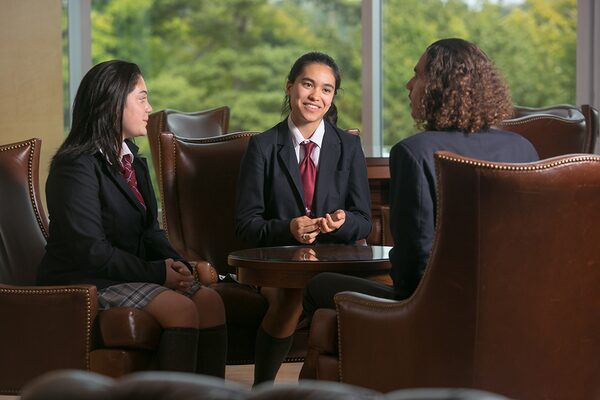
At TFS - Canada’s International School, students like Talise, Elizabeth and Devon engage in regular debates about global issues as part of the school’s citizenship program.supplied
Elizabeth W. is only 17, but she’s no stranger to talking about big issues.
Like all students at TFS – Canada’s International School, she has been regularly discussing ethics, philosophy and current events in a dedicated mentorship group as part of the school’s global citizenship program.
“The other day we discussed how efficacious democracy is,” Elizabeth says. “We were thinking of different countries and how democracy can facilitate good inputs from citizens, but also lead to dangerous consequences when you have a majority that is problematic. We talked a little bit about Brexit, and about China and the Hong Kong protests.”
The small groups, which are facilitated by teachers and meet weekly, are a major part of TFS’ commitment to push the boundaries of education beyond traditional academic achievement. The school, which was the pioneer of French immersion education in Canada has, in recent years, made citizenship an additional focus.
“We’ve evolved to not just include languages and rigorous academics, but also a focus on the all-round development of students and their responsibilities as citizens,” says Mitch Frazer, the incoming TFS Foundation chair and partner at international business law firm Torys LLP.
“That means thinking about the child, but also the adult that they’re trying to become, inspiring them to be active and engaged, to contribute back into the real world,” Frazer says. “Education is not just inward-facing; we’re looking at teaching students to explore the world, to be open to new ideas and international perspectives.”
For Frazer, whose two sons attend the school, that global perspective is crucial in an increasingly connected and globalized world.
“We owe the world more than just teaching our kids the basics,” he says. “Citizenship really ties everything together. To be a good global citizen is to be a critical thinker, a discerning person, and a creative problem solver. These are skills and attitudes that can’t be replaced with technology.”
But skills like global-mindedness and critical thinking can feel intangible and are often difficult to teach. To Judy Goldring – chair of the school’s board of directors and president and chief administration officer of AGF Management Ltd. – doing so begins in the classroom. At TFS, the academically rigorous curriculum from France is taught, together with the Ontario program, through the skills-based, globally recognized International Baccalaureate (IB) framework.
Goldring, whose 11- and 14-year-old daughters both attend TFS, takes comfort in knowing that the French and IB curricula instil a strong work ethic and sense of global responsibility in students.
“Our motto is ‘individuals who reflect, citizens who act.’ That means we ensure there’s strong academic excellence,” Goldring says. “The IB program allows a different framework around how children develop and learn. It encourages them to think critically in a much more comprehensive and deeper fashion. The kids don’t just go into class and memorize the facts.”
Language education also plays an important role in TFS’ citizenship programming. Mastering French and English facilitates bilingualism, but TFS students also take a third language: Goldring’s daughters are both studying Mandarin at the school. Her eldest daughter is now old enough to take advantage of the international study trips and exchanges the school offers, and is currently weighing the choice between travelling to Martinique or China during the coming March break.
TFS is also home to a diverse staff and student body who speak more than 50 languages at home – so cross-cultural exchanges between students takes place both within the classroom and outside of it. As the largest independent school in Canada, the number of students allows for a wide range of extracurricular activities: TFS is home to more than 90 athletic teams competing in 14 sports and more than 40 student-led clubs.
Students also participate in societies that aim to build a sense of social and environmental responsibility, often in partnership with local non-governmental organizations. Elizabeth, for example, participates in SAC commence par moi, a student-led group that crochets plastic bags into reusable sacks to raise awareness of pollution and the harm caused by single-use plastics.
And where other schools might have a head boy and girl, TFS has a ‘premier citoyen’ and a ‘première citoyenne,’ or ‘first citizens,’ elected by staff and students. This year, Elizabeth is one half of that pair.
“We’re meant to be not only role models, but to relay ideas from students to the school’s leadership team,” she says. “We go to various meetings with members of staff and I also chair student leadership meetings. Our role is to foster proposals that arise from the student body and try to make those changes.”
Elizabeth says serving as première citoyenne has given her valuable leadership experience and empowered her with the knowledge that her actions can make a difference in the school.
“The role is changing me in a good way, because I have more responsibility. It is also lets me see students differently. In a class setting, we don’t get to talk about the more creative aspects of student life. In these meetings, I hear really great ideas to make even small changes, that can be very impactful. It’s made me more aware of the diverse interests that our student community has.”
Advertising feature produced by Globe Content Studio. The Globe’s editorial department was not involved.